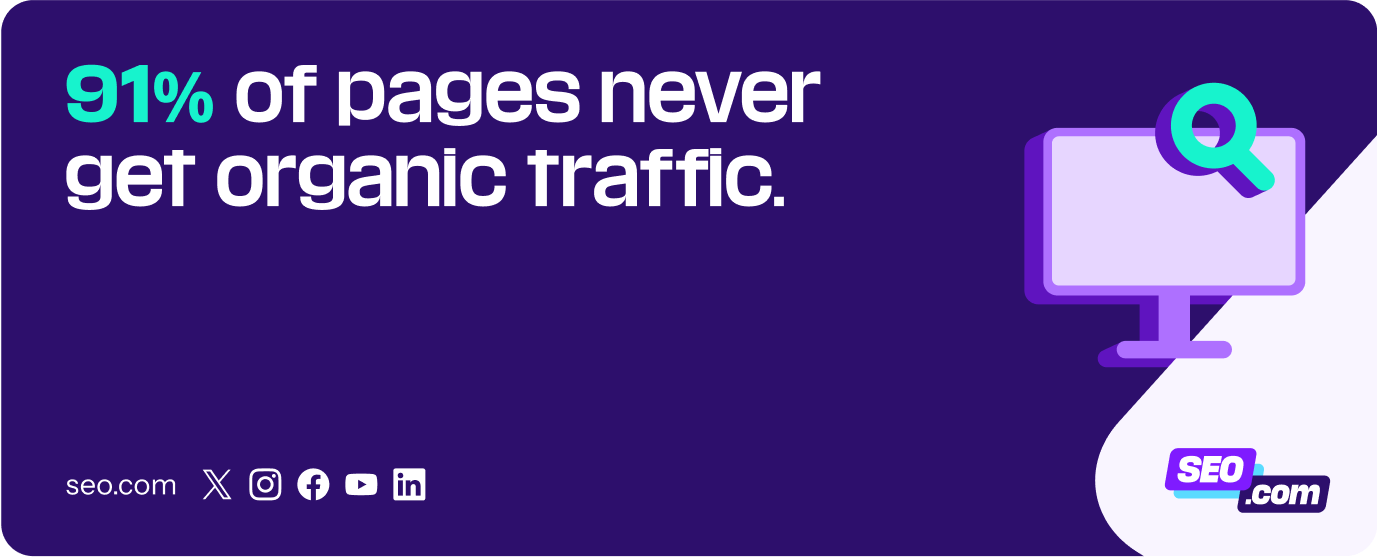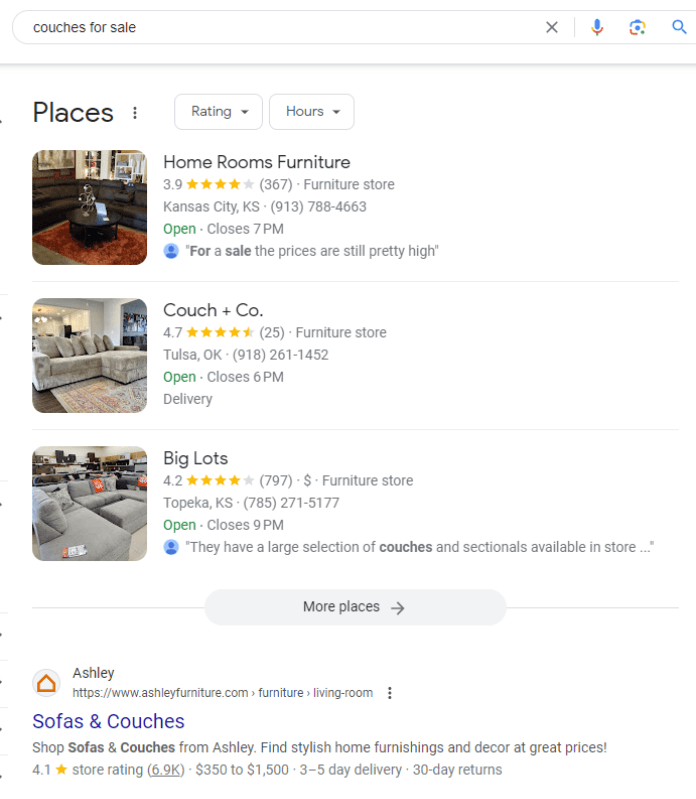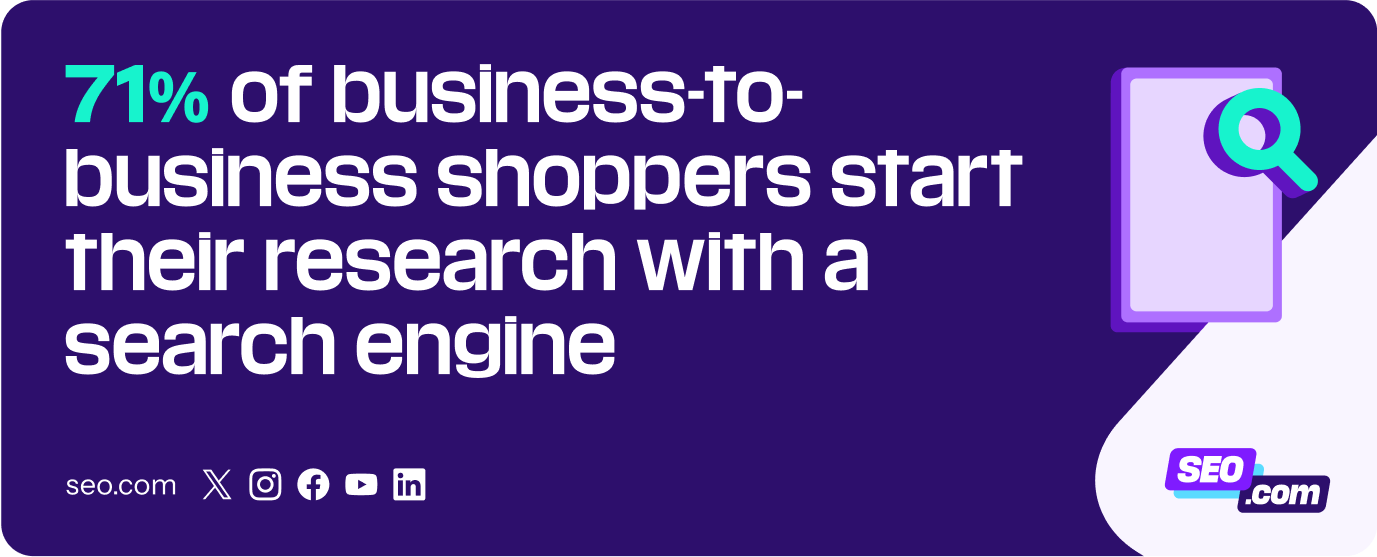Why is SEO important? Because it’s powering more than 40% of revenue for businesses today. With search engine optimization (SEO), your organization can reach its target market when they’re looking for you, resulting in more growth for your business.
Learn more about why SEO matters now:
What is SEO?
SEO, or search engine optimization, is a strategic process that aims to increase website visibility and ranking in search engines. The end goal is increased organic traffic and a more prominent online presence.
How does SEO work?
Search engine optimization works by aligning your website with search engine algorithms. These algorithms focus on generating relevant, trustworthy search results, which is why SEO optimizations commonly include:
- Ensuring search engines can crawl and index site content
- Enhancing content helpfulness with first-hand experiences
- Including trust signals, like certifications, awards, and testimonials
- Producing content that attracts backlinks from other reputable sites
You can learn more about how SEO works in our SEO guide. These signals fall into several key components of SEO: on-site, off-site, technical, and local SEO.
On-Site SEO
On-site (or on-page) SEO involves optimizing elements directly on your website to improve its visibility in search engines. This includes:
- Keyword optimization: Using relevant keywords in your content, titles, headers, and meta descriptions.
- Content quality: Creating valuable, engaging, and original content that meets user intent.
- Internal linking: Structuring links within your website to help users (and search engines) navigate your site easily.
- User experience (UX): Ensuring a clean layout, fast loading times, mobile responsiveness, and accessible design.
Off-Site SEO
Off-site SEO focuses on building your website’s reputation and authority through external efforts, primarily:
- Backlinks: Earning high-quality backlinks from reputable websites signals to search engines that your site is trustworthy and authoritative.
- Social signals: While not a direct ranking factor, social engagement can amplify your content’s reach and generate valuable traffic and backlinks.
- Brand mentions: Citations of your brand across the web, even without a link, can contribute to your site’s perceived credibility.
Technical SEO
Technical SEO ensures that your website is optimized for crawling and indexing by search engines. It includes:
- Site speed: Faster websites offer better user experiences and rank higher.
- Mobile-friendliness: With the majority of searches happening on mobile devices, responsive design is critical.
- Secure connections: HTTPS is a ranking signal and builds user trust.
- Structured data (schema): Adding structured data helps search engines understand your content and display rich snippets in results.
Local SEO
For businesses targeting local audiences, local SEO is crucial. It helps your website appear in local search results and maps listings by focusing on:
- Google Business Profile optimization: Keeping your business information up to date, including hours, services, and location.
- Local citations: Consistent NAP (Name, Address, Phone number) information across directories and platforms.
- Local reviews: Encouraging and responding to reviews builds trust and impacts local rankings.
- Localized content: Creating content specific to your area, services, or community enhances relevance in local searches.
Why is SEO important?
SEO is important because of its reach, effectiveness, and accessibility to businesses of all sizes. With search engine optimization, organizations can improve their visibility in organic search, and reach their target market, resulting in more traffic and revenue.
10 reasons why SEO is important
Explore why SEO is important now:
1. Increases visibility
One of the most important reasons companies invest in SEO is to improve their online rankings. The higher you rank on search engine results pages (SERPs), the more likely customers will click through to your website.

Most website visits come from organic search rather than paid aids, social media clicks, or other sources. Optimizing websites to rank highly on search engines allows you to attract more organic traffic over time as rankings increase.
2. Generates qualified traffic
Organic traffic is visitors who find a website through unpaid search engine results, not through paid ads. Content quality also impacts search engine ranking.
SEO does more than improve your traffic numbers — it improves your traffic quality.

The value of SEO is its ability to target the searches most relevant to your business and its target audience.
Instead of focusing on broad, short-tail keywords like ‘home renovation contractors’, you can target long-tail keywords like ‘home renovation contractors greenville sc’ to reach a more qualified audience.
3. Builds trust, authority, and credibility
If users search multiple times on similar topics and always see your website on the first page of search results, they’ll start to see you as a trusted and credible source of information.
Google also places a high value on Expertise, Experience, Authoritativeness, and Trustworthiness (E-E-A-T). Though it’s not a specific ranking factor, it affects how people see your content and business.
By consistently following Google’s E-E-A-T guidelines and producing high-quality content and website pages, you will build your authority and credibility in your industry, leading customers to trust your brand.
4. Delivers user insights
Since customers do everything from research to shopping online, analyzing their behavior and practicing SEO helps you learn what your customers want and need.
Learning search intent makes SEO more successful. Search intent tells you why users enter a query into a search engine. The primary forms of search intent are:
- Navigational
- Informational
- Commercial
- Transactional

When you understand customer intent, you will discover where they stand in the buyer’s journey and create content that’s more relevant to them.
5. Improves user experience
People searching online want a fast and easy way to find information or buy products or services. If they don’t see what they’re looking for, they may leave the site quickly.
Pages with high bounce rates indicate to search engines that your page doesn’t have what they need, and your website will rank lower.
User experience involves creating positive interactions with your website. Beyond getting your site to rank highly, SEO helps you identify areas to improve your user experience, creating more positive user interactions.
6. Optimizes marketing spend
Improving your SEO strategy will cost you money, but SEO often has a relatively low cost compared to the benefits you will experience.
By using SEO, you will grow traffic to your website organically without paying for ads on social media or ad placements on SERPs. SEO sees long-term benefits because your site will gain more attention over time without an additional investment like continued ad payments.
7. Generates measurable results
The money you invest in SEO will bring an excellent return on investment (ROI). Track this ROI by comparing your investment in SEO to the gain in conversions you received through this investment.
Other data like page rankings, bounce rate, and organic search traffic further indicate your success. Remember that SEO will take several months to generate results. Set these expectations early so you can wait to look for results.
8. Targets the entire buyer journey
Behavior involves optimizing website content with relevant keywords, building backlinks from reputable sites, and ensuring technical and user experience optimization to improve visibility and ranking on search engine results pages.

Unlike pay-per-click (PPC) ads, which typically target more transactional searches, SEO targets searches throughout the funnel, from awareness to consideration to purchase. This versatility adds to SEO’s importance in digital marketing.
With a full-funnel approach, you can reach users throughout their journey, and create impactful touchpoints so when they’re ready to buy, it’s your business (and not the competition) they choose.
9. Enhances brand reputation
When your business appears frequently in search results, people will begin to associate your company with particular topics and expertise.
As your name pops up repeatedly, searchers see you as an authority in an area. They begin to trust you, leading them to choose your company over a competitor when it comes to buying a product or service.
Your brand sets you apart from others in the market that provide the same products and services — SEO helps you build that brand.
Free domain overview
Oops! You are too eager for information and you’ve reached your daily amount of requests. Feel free to check it tomorrow.
Mmm… an error occurred during processing. Please refresh the page and try again.
We are working to fix it right now. Please, try again in a few minutes.
Access denied: Your session token is invalid or missing. Please refresh the page to continue.

Monthly Traffic data for “” vs “”
Your domain’s traffic
Your competitor’s traffic
“” ranks for keywords that you don’t
| Keyword | URL | ETV |
10. Complements other marketing efforts
Your business may already use digital marketing techniques like social media or pay-per-click advertising. SEO fills in the gaps that other marketing strategies miss.
When you combine SEO with PPC or other marketing efforts, you will benefit your overall marketing performance. For example, you may use SEO initially to attract site visitors, then use PPC remarketing to bring those customers back to purchase.
If you rank organically and in paid search, you will even appear twice in search results, increasing the possibility of getting clicks.
Why is SEO still important?
Search engines like Google launched more than 20 years ago, and just like Google, search engine optimization has remained important. SEO’s importance hasn’t faded because people still rely on search to find what they need.
That’s why search engines prioritize delivering reputable and helpful search results — if they didn’t, people would find an alternative. This emphasis on reputable and helpful search results has created higher standards for businesses and their websites.
The Role of AI in SEO and Its Impact
Artificial Intelligence (AI) is playing an increasingly significant role in SEO, transforming how search engines process information and how digital marketers approach optimization strategies. While AI has revolutionized many aspects of SEO, it’s important to understand that it is not here to replace SEO, but to enhance it.
AI helps search engines better understand user intent and content relevance. For instance, AI-powered algorithms like Google’s BERT and RankBrain can process natural language and understand the context behind queries, delivering more accurate search results. Moreover, AI tools are now assisting marketers with keyword research, content optimization, and even predicting search trends based on user behavior.
However, despite these advancements, AI cannot fully replace human expertise in SEO. SEO requires creativity, strategic thinking, and a deep understanding of user behavior—areas where human input is still crucial. While AI can automate some tasks, such as data analysis or content generation, human oversight ensures that SEO strategies align with business goals and adapt to changes in search engine algorithms.
For a more in-depth look at how AI is shaping the future of SEO, check out our full article: Will AI Replace SEO?
Experience the value of SEO with pros
From increasing your visibility and traffic from search engines to enhancing your online brand reputation, the importance of SEO cannot be understated. It’s a vital strategy to consider in your marketing efforts.
Get the most value from your SEO efforts with professional management services from WebFX (the team behind SEO.com). Companies worldwide trust our team to handle their SEO and improve rankings.
Reach out to our team online today to start a conversation about SEO and how we support your business.
Let’s Drive Results
Together


$3bn+
revenue driven for clients



Add WebFX to your content marketing toolbox today
Get SEO Proposal$3bn+
revenue driven for clients



Add WebFX to your content marketing toolbox today
Get SEO ProposalWhat to read next
- Feb 25, 2025
- 7 min. read





